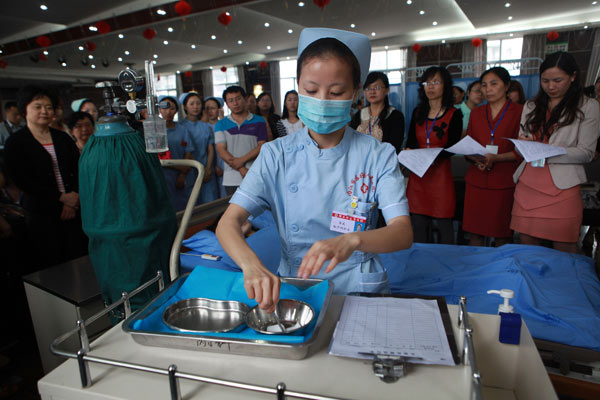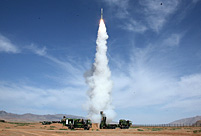 |
| A nurse demonstrates oxygen treatment at a professional skills competition in Neijiang, Sichuan province. LAN ZITANG / FOR CHINA DAILY |
A win-win deal
Compared with the average monthly salary of about 3,320 yuan ($540 or about 400 euros) for a nurse in China, working overseas represents a good deal.
Wang Zhuwen, director of operations at Shandong International Nurse Training Center, which is responsible for training the 150 Chinese nurses who will work in Germany from this year, said: "Most overseas Chinese nurses earn more than they do in China. In Germany, the gross starting salary for nurses in public hospitals ranges from 2,190 to 2,365 euros ($2,957-$3,193) a month."
Many Chinese nurses are passionate about going abroad, not only because of the higher salary, but also because they receive greater respect from patients, he said.
Relations between medical staff and patients have been severely strained in China over the past years. Without competition from privately owned hospitals, public hospitals take almost all the responsibility for patients' medical services. Patients have not been happy with hospital services, while doctors have complained of low salaries.
"In some other countries, nurses enjoy more respect and hospitals place greater value on their services. It is also the dream of many young people to see the outside world," Wang said.
He added that some Chinese nurses have migrated after working overseas for several years, while others found better jobs after returning to China.
The nurses' training center in Shandong province is owned by an overseas personnel-training company, formed in 1989. To date, more than 80,000 Chinese have been trained and sent overseas through the center. Previously, most of the workers were blue-collar employees, such as welders and farm workers. Now, demand has grown overseas for more skilled workers from China, including nurses.
Since the training center was set up in 2005, more than 1,000 Chinese nurses have been sent abroad, mostly to Asian countries, including Singapore and Japan, which have a shortage of nurses along with an aging problem.
"The consequences of this immigration will be mainly positive," said Schmutzler, the press official with the German Federal Employment Agency.
He believes such immigration will increase, because the labor force in Germany will decline in coming decades as the number of elderly people increases.
"Neither immigration from European Union countries, nor from non-EU countries, may be able to fill this gap alone. Only a mixture of both, plus domestic measures to activate hidden potentials in the German labor market, will help to meet this challenge successfully," he said.
Wagner, from the German Nurses Association, said, "In the short term, we will be able to cover vacancies with German nurses if employers create better working conditions."
He said thousands of German nurses have left the profession, unwilling to cope any longer with the workload and other factors. "If more nurses from abroad come to Germany, I assume many will move on to other countries in Europe where they will find better jobs," he added.


 Storms leave 97 dead, 58 missing in Mexico
Storms leave 97 dead, 58 missing in Mexico New model of indigenous surface-to-air missiles testfired
New model of indigenous surface-to-air missiles testfired  118.28-carat diamond to be auctioned in HK
118.28-carat diamond to be auctioned in HK Maternal love under streetlight
Maternal love under streetlight Naked foreign student sits in the middle of a road in Haikou
Naked foreign student sits in the middle of a road in Haikou  Colorful Yunnan: Enjoy the natural beauty
Colorful Yunnan: Enjoy the natural beauty Harbin named Chinese city with most beautiful women
Harbin named Chinese city with most beautiful women New college students' military training in Guangzhou
New college students' military training in Guangzhou Rugby girls
Rugby girls PLA's 38th Group Army conduct training
PLA's 38th Group Army conduct training Residences of the royal house of Savoy
Residences of the royal house of Savoy The last days of Wan Aihua
The last days of Wan Aihua Highlights at 12th National Games of China
Highlights at 12th National Games of China Beijing Film Academy welcomes freshmen
Beijing Film Academy welcomes freshmen Large mahjong party sets new world record
Large mahjong party sets new world recordDay|Week|Month